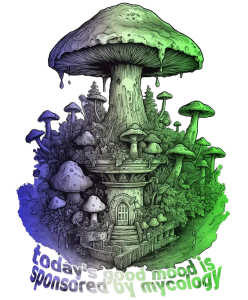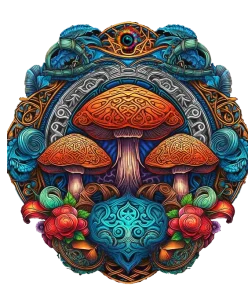Depression is one of the most widespread mental health conditions globally, impacting millions of lives and often proving difficult to manage. While many individuals benefit from treatments like psychotherapy and antidepressants, there remains a significant group of people who do not respond to these conventional approaches. This condition is referred to as treatment-resistant depression, and it leaves individuals with few options. However, emerging research on psilocybin—a naturally occurring psychedelic found in certain mushrooms—is offering new hope for treating even the most resistant forms of depression. Could psilocybin revolutionize the way we approach this complex mental health condition?
What Is Psilocybin and How Does It Work?
Psilocybin is the active psychedelic compound in magic mushrooms, and when consumed, it is converted in the body to psilocin. This compound then interacts with serotonin receptors in the brain, particularly the 5-HT2A receptor, which plays a key role in mood regulation and perception. These effects contribute to the altered consciousness and profound experiences that psilocybin is known for, but they also suggest a potential therapeutic use.
Psychedelics like psilocybin have been utilized for centuries in various cultural rituals, especially in indigenous traditions, as a tool for spiritual and emotional healing. Today, the scientific community is increasingly interested in psilocybin’s ability to help those with depression, particularly those who have exhausted other treatment options.
Why Treatment-Resistant Depression Is So Challenging
Treatment-resistant depression (TRD) is a form of depression that does not improve even after the individual has tried multiple antidepressants, therapies, or interventions. TRD is particularly debilitating because of the emotional and psychological toll it takes on those who struggle with it. It can leave individuals feeling hopeless, frustrated, and disconnected from the world around them.
Standard treatments for depression typically include selective serotonin reuptake inhibitors (SSRIs) and cognitive-behavioral therapy (CBT). While these approaches work for many, they aren’t universally effective. This is because depression is a complex condition with diverse causes that include genetics, environmental factors, neurochemical imbalances, and life trauma. For some people, the brain’s response to conventional treatment is simply not enough, leaving them searching for alternatives that could finally bring them relief.
Psilocybin’s Mechanism of Action in the Brain
Psilocybin’s potential as a treatment for depression comes from its unique effects on the brain. By binding to serotonin receptors, specifically the 5-HT2A receptor, psilocybin alters the way the brain processes emotions and perceptions. It also induces changes in the brain’s default mode network (DMN), a network of interacting brain regions that are active when the mind is at rest and engaged in self-reflective thought. In individuals with depression, this network tends to become hyperactive, leading to repetitive negative thoughts or “rumination.”
When psilocybin reduces activity in the DMN, it appears to “loosen” rigid thought patterns and create an opportunity for the brain to approach emotions, memories, and self-perceptions from a new perspective. This resetting of the brain’s rigid mental states is a key factor in how psilocybin might alleviate symptoms of depression.
Another critical factor is neuroplasticity—the brain’s ability to form new neural connections. Depression is often associated with a reduction in neuroplasticity, meaning that the brain becomes less flexible in its thinking and emotional responses. Psilocybin enhances neuroplasticity, which can help the brain adopt healthier ways of processing emotions and reacting to life’s challenges.
Research into Psilocybin as a Depression Treatment
The interest in psilocybin as a treatment for depression is backed by rigorous scientific research. Studies conducted at leading institutions, such as Johns Hopkins University and Imperial College London, have shown promising results for psilocybin-assisted therapy in treating major depression and treatment-resistant cases.
One landmark study published in The New England Journal of Medicine compared the effects of psilocybin to those of escitalopram, a commonly prescribed SSRI. The findings were compelling: individuals treated with psilocybin showed a more significant reduction in depressive symptoms than those who took the traditional antidepressant. Even more remarkable was the sustained improvement seen in the psilocybin group, with many participants experiencing relief for weeks or months after just a single dose.
Similarly, research from Imperial College London demonstrated that psilocybin can produce profound reductions in depressive symptoms in individuals with treatment-resistant depression. In a study of participants who had not responded to conventional therapies, nearly 67% reported improvement in their symptoms just one week after their psilocybin session. For nearly half of the participants, these effects persisted for at least three months.
The Psilocybin Therapy Process
Psilocybin-assisted therapy differs from traditional pharmacological treatments for depression. Rather than requiring a daily dose of medication, psilocybin therapy typically involves one or two guided sessions, each lasting several hours. These sessions take place in a controlled, clinical environment with trained therapists present to guide and support the individual throughout the process.
Before undergoing the psilocybin session, patients participate in preparatory therapy sessions where they establish a rapport with their therapist, set intentions for the treatment, and discuss potential outcomes. During the psilocybin session itself, the individual ingests a carefully measured dose of psilocybin, often while reclining in a peaceful setting with eye shades and music to encourage introspection.
Throughout the session, the patient may experience vivid visuals, revisit past memories, and engage in deep emotional reflection. Many describe the experience as one of emotional openness, in which they can confront and process difficult emotions or memories with greater ease than they typically could in ordinary therapy.
The final component of psilocybin therapy is integration. In the weeks following the session, patients work with their therapist to process the emotions and insights gained during the experience. The integration phase is crucial for translating the insights from the psychedelic experience into lasting improvements in mental health.
How Psilocybin Differs from Traditional Antidepressants
While traditional antidepressants like SSRIs require consistent, long-term use to regulate serotonin levels, psilocybin appears to have more immediate and sustained effects, often after just one or two sessions. SSRIs work by increasing the availability of serotonin over time, which helps improve mood gradually. Psilocybin, on the other hand, creates a profound shift in consciousness that can rapidly change the way an individual views themselves and their depression.
This difference in approach is especially significant for individuals with treatment-resistant depression. Many people with TRD have already tried several medications without success. Psilocybin’s ability to act quickly and in a different manner than SSRIs offers hope for those who have not found relief from standard treatments.
Additionally, psilocybin therapy often involves confronting and processing deep-rooted emotional issues in a way that traditional medications do not. This active engagement with emotions, trauma, and self-perception helps many individuals gain new perspectives on their depression, leading to more meaningful and lasting changes.
The Risks of Psilocybin Therapy
As with any therapeutic intervention, psilocybin therapy is not without risks. While psilocybin is generally considered physiologically safe—meaning it does not carry the same risks of overdose or addiction as other substances—there are psychological risks to consider. The psychedelic experience can be intense, and some individuals may experience anxiety, fear, or confusion during their sessions. These negative reactions are more likely when psilocybin is taken in an uncontrolled or unsupervised environment.
However, when psilocybin is administered in a controlled clinical setting with trained therapists, these risks are minimized. The therapists are present to provide support and reassurance, helping the individual navigate difficult emotions that may arise during the session.
Moreover, psilocybin therapy is not appropriate for everyone. Individuals with a history of schizophrenia, bipolar disorder, or other psychotic disorders may be at higher risk of adverse psychological reactions and should avoid psilocybin therapy.
Ethical Considerations and Legal Status
Despite the growing body of evidence supporting psilocybin therapy, the drug remains illegal in many parts of the world. In the United States, psilocybin is classified as a Schedule I substance under the Controlled Substances Act, which means it is considered to have no accepted medical use and a high potential for abuse. However, several states and cities, including Oregon and Denver, have decriminalized psilocybin, making it more accessible for research and medical use.
As interest in psilocybin continues to grow, there are also ethical concerns surrounding its use. One of the main issues is accessibility. Psilocybin therapy, particularly in the context of clinical trials, is expensive and time-consuming, which may limit access for individuals who could benefit from it but cannot afford the treatment.
There is also the question of commercialization. As psilocybin moves closer to becoming a mainstream treatment, there is concern that its commercialization could lead to profit-driven practices that may overshadow the therapeutic potential of the drug.
The Future of Psilocybin in Treating Depression
As research continues, there is a growing sense that psilocybin could play a significant role in the future of depression treatment, particularly for individuals with treatment-resistant depression. With ongoing clinical trials and increasing advocacy for the decriminalization and legalization of psychedelics, it is likely that psilocybin will become more widely available as a treatment option in the coming years


